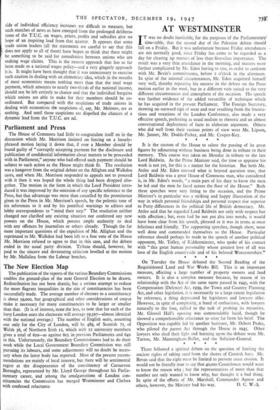AT WESTMINSTER
IT was no doubt inevitable, for the purposes of the Parliamentary' time-table, that the second day of the Palestine debate should fall on a Friday. But it was unfortunate because Friday attendances are not normally good, since Friday has come to be regarded as a day for clearing up matters of less than first-class importance. The result was a very thin attendance in the morning, and matters were further complicated by Mr. Eden having to rise, in order to conform with Mr. Bevin's commitments, before 2 o'clock in the afternoon. In spite of the unusual circumstances, Mr. Eden acquitted himself very well, thereby repeating his success in the debate on the Press motion earlier in the week, but in a different vein suited to the very different circumstances and atmosphere of the occasion. His speech was further evidence of the added versatility of technique which he has acquired in the present Parliament. The Foreign Secretary, showing no outward sign of wear and tear resulting from the frustra- tions and vexations of the London Conference, also made a very effective speech, preferring as usual realism to rhetoric and an almost conversational deployment of facts to elaborate argument. Others who did well from their various points of view were Mr. Lipson,
Mr. Janner, Mr. Dodds-Parker, and Mr. Cooper-Key. * * It is the custom of the House to salute the passing of its great figures by adjourning without business being done in tribute to their memory. This course was taken on Monday in tribute to the late Lord Baldwin. As the Prime Minister said, the time to appraise his work is not yet, for this is a matter for the historian. But both Mr. Attlee and Mr. Eden stressed what is beyond question true, that Lord Baldwin was a great House of Commons man, who considered it, in Mr. Eden's words, " a main part of his duty to know the men he led and the men he faced across the floor of the House." Both these speeches were very fitting to the occasion, and the Prime Minister's in particular was a striking and happy illustration of the way in which personal friendships and personal respect rise superior to Party differences in the political life of British democracy. Mr. Attlee said that he regarded Lord Baldwin not only with respect but with affection ; but, even had he not put this into words, it would have been clear from his speech, phrased as it was in terms at once felicitous and friendly. The supporting speeches, though short, were well done and commended themselves to the House. Particular reference should perhaps be made to the speech of another political opponent, Mr. Tolley, of Kidderminster, who spoke of his contact with " this great human personality whose greatest love of all was love of the English countryside and of his beloved Worcestershire." * * * * On Tuesday the House debated the Second Reading of the Requisitioned Land and War Works Bill. This is an important measure, affecting a large number of property owners and land owners. It is also a complex measure because, by reason of its relationship with the Act of the same name passed in 1945, with the Compensation (Defence) Act, 1939, the Town and Country Planning Act, and other legislation, it is necessarily to a large extent legislation by reference, a thing deprecated by legislators and lawyers alike. However, in spite of complexity, a band of enthusiasts, with lawyers naturally to the fore, rallied to the task of probing its mysteries. Mr. Glenvil Hall's opening was commendably lucid, though he showed a comprehensible reluctance to stray far from his brief. The Opposition was capably led by another barrister, Mr. Osbert Peake, who piloted the parent Act through the House in 1945. Other lawyers who shed their light and learning upon the debate were Mr.
Turton, Mr. Manningham-Buller, and the Solicitor-General. * * There followed a spirited debate on the question of limiting the ancient rights of taking sand from the shores of Cornish bays. Mr. Bevan said that the right must be limited to prevent coast erosion. It would not be literally true to say that 40,000 Cornishmen would want to know the reason why ; but the representatives of more than that number not only wanted to know why, but thought it a bad thing. In spite of the efforts of Mr. Marshall, Commander Agnew and others, however, the Minister had his way. D. C. W.-S.


































 Previous page
Previous page